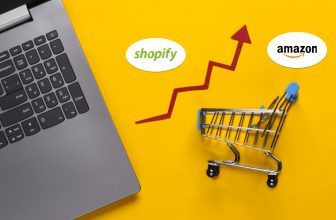
In today’s digital-first world, having a business without an online presence is like opening a store in the middle of a desert—no matter how great your products or services are, no one will find you.
Whether you’re running a local bakery, a tech startup, or an online consultancy, getting your business seen online is crucial for growth, credibility, and customer acquisition.
To know the answers to those questions, you need to properly understand your brand inside and out. From there, you can begin to look at different approaches that increase your visibility and have audiences associate your name with the very industry that you find yourself in.
Why Online Visibility Matters
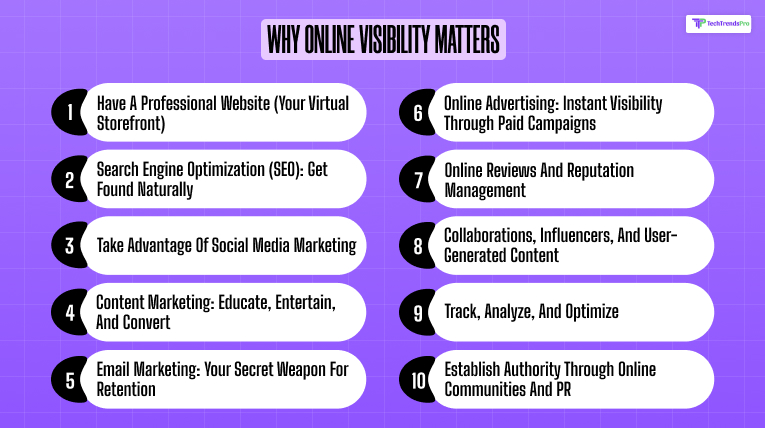
Before discussing strategies, let’s talk about why appearing online is crucial:
- 97% of consumers search for local businesses using the internet.
- 75% of users never scroll beyond the first page of search engine results.
- Solid online reputation businesses develop more leads, sales, and loyalty.
Unless your target group can’t perceive you, then they’ll look at your competitor. Period.
1. Have A Professional Website (Your Virtual Storefront)
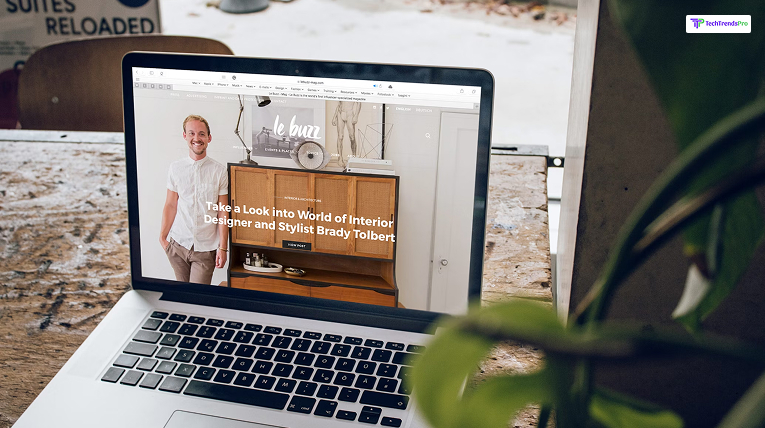
Your site is your landing page. It must represent your brand, communicate essential information, and invite action.
Components Of A High-Influence Website:
- Mobile-Responsive Design: Mobile browsers comprise over 60% of visits.
- Fast Load Time: Below 3 seconds to prevent bounce rate.
- Simple Navigation: Simple to locate products/services, contact us, and about us.
- SEO Optimization: Search term targets, meta tags, and data structure.
- Call to Action (CTAs): Encourage users to subscribe, purchase, book, or call you.
Bonus Tip: Use sites like WordPress, Wix, or Shopify as they are simple to install and have SEO-friendly templates.
2. Search Engine Optimization (SEO): Get Found Naturally
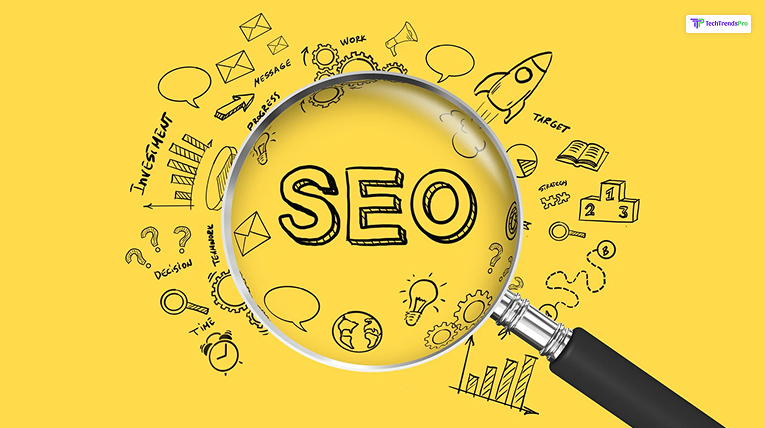
SEO is the art and science of having your site listed in Google or other search engines. And it does exactly that and provides free, steady traffic in the long run.
Most Critical SEO Elements:
On-Page SEO
- Keyword usage in titles, headings, and content
- Meta description and URL optimized
- Internal linking of service and blog pages
- Image alt tag and speed-optimized images
Off-Page SEO
- Authority backlinks
- Social share signals
- Google Business Profile and review writing
Local SEO
- Google Business Profile optimization
- Local keyword usage (e.g., “best pizza in Brooklyn”)
- Directory listing such as Yelp, Bing, TripAdvisor, etc.
Useful SEO Tools:
- Google Search Console – Tracking site performance
- Ahrefs / SEMrush – Keyword research & backlink checking
- Yoast SEO – WordPress plugin for optimization
3. Take Advantage Of Social Media Marketing

With over 4.5 billion users, social media is a goldmine to find new customers and build a base for your business.
Platform-Specific Strategies:
Facebook & Instagram
- Suitable for visual content, local businesses, and lifestyle brands
- Use Reels, Stories, and ads to gain engagement
- Build Shops for in-app purchases
- Suitable for B2B services, coaching, and professional services
- Post thought-leadership articles and connect with peers
TikTok & YouTube Shorts
- Best suited for viral material, how-to, behind-the-scenes
- Use trending audio and hashtags
- Best suited for home decor, fashion, wellness, and food show vignettes
- Works on long-term traffic through pins to blog or product pages
Pro Tip: Have a consistent brand voice and visual identity across channels.
4. Content Marketing: Educate, Entertain, And Convert

Content marketing builds trust and credibility. Provide people quality, engaging content, and they will do business with you.
Content to Create:
- Blog Posts: SEO’d, answering common customer questions
- Videos: Product intro’s, how-to’s, testimonials
- Infographics: Shareable visual summaries for heavy data
- Ebooks/Whitepapers: Use gated content to create leads
- Podcasts: Set your tone in the room
Success Tips:
- Learn about your audience and their aches.
- Create a content calendar.
- Repurpose content channel to channel (i.e., blog post to YouTube video).
5. Email Marketing: Your Secret Weapon For Retention
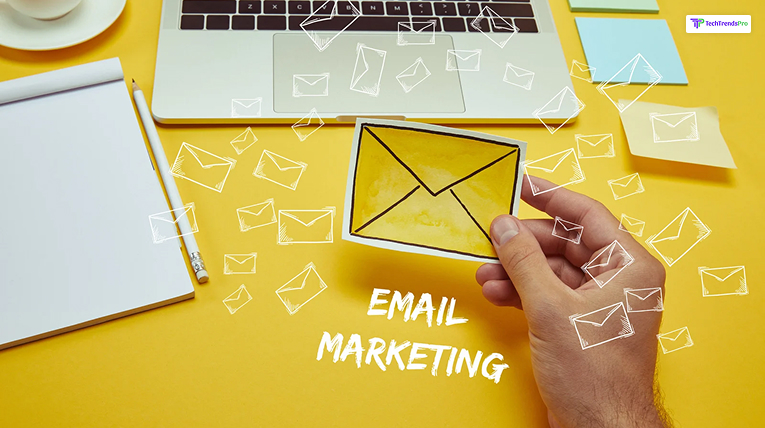
One of the highest ROI web tactics is email marketing. It yields $36 for each $1 spent.
Email Strategies:
- Welcome Series: Welcome new subscribers with a warm, informative series
- Product Announcements & Promotions: Drive direct conversions
- Weekly/Monthly Newsletters: Keep top-of-mind with tips and news
- Cart Abandonment Emails: To follow up on missed sales
Tools to Use:
- Mailchimp
- ConvertKit
- Klaviyo (best for eCommerce)
Pro Tip: List segmentation based on customer behavior for a successful outreach.
6. Online Advertising: Instant Visibility Through Paid Campaigns
Yes, organic growth is nice, but if done, paid advertising has the advantage of instant visibility.
Ad Platforms to Explore:
- Google Ads: Target based on the intent of the search
- Facebook & Instagram Ads: Best for reaching by behavior, demographics, and interests
- YouTube Ads: Most suited for brand awareness and visual learning
- LinkedIn Ads: Most suitable for B2B lead gen
High-Performing Ad Tips:
- Write good headlines and short CTAs
- A/B test several creatives
- Retarget to reclaim repeat visitors
7. Online Reviews And Reputation Management
Your reputation online makes or breaks your business. Reviews build trust and drive search rankings.
Get More Reviews By:
- Asking happy customers after a purchase
- Follow-up emails through automation
- Offering incentives (offers or promotions)
Key Platforms:
- Google Business Profile
- Yelp
- Trustpilot
Important: Respond to all reviews—positive and negative—to show activity and professionalism.
8. Collaborations, Influencers, And User-Generated Content

Word of mouth does work—but now it’s on the web.
How to Increase Reach:
- Collaborate with micro-influencers in your niche
- Utilize co-marketing campaigns with non-competing businesses
- Participate in user-generated content (e.g., photo contest, product review)
Pro Tip: Display your customers on your site and social media for trust and loyalty.
9. Track, Analyze, And Optimize
What can be measured can be optimized. Use analysis tools to track performance and optimize where needed.
Key Metrics to Track:
- Website traffic and bounce rate
- Conversion (sales, signups, downloads)
- Email open and click-through rate
- Social activity
- Paid campaign ROI
Tools to Use:
- Google Analytics
- Hotjar (heatmaps)
- Meta Business Suite
- HubSpot for end-to-end CRM and analytics
10. Establish Authority Through Online Communities And PR
Online authority is more than SEO and advertising. Engage in communities, answer questions, and get mentioned.
Authority-Building Strategies:
- Guest blogging
- Speaking on podcasts/webinars
- Joining discussions on Reddit or Quora
- Getting published in online magazines (PR outreach)
Multi-Channel Is The Key To Online Visibility
Putting your business online is not about selecting one approach—it’s about stacking a few approaches in a bid to maximize visibility, authority, and conversion.
In short, these are the things that you need to pay attention to:
- Build a mobile-friendly, optimized website.
- Spend on SEO with an eye to gaining organic visibility.
- Use social media to engage with your customers.
- Release quality content on a regular basis.
- Apply email nurturing.
- Use paid advertising to gain short-term visibility.
- Build a strong online reputation.
- Work together and engage with influencers.
- Monitor performance and optimize.
- Build credibility through being a community player.
Utilize a repeatable, data-driven, and thoughtful process and you can build an online presence that not only generates attention—but actually results in significant business growth.
Read Also:





